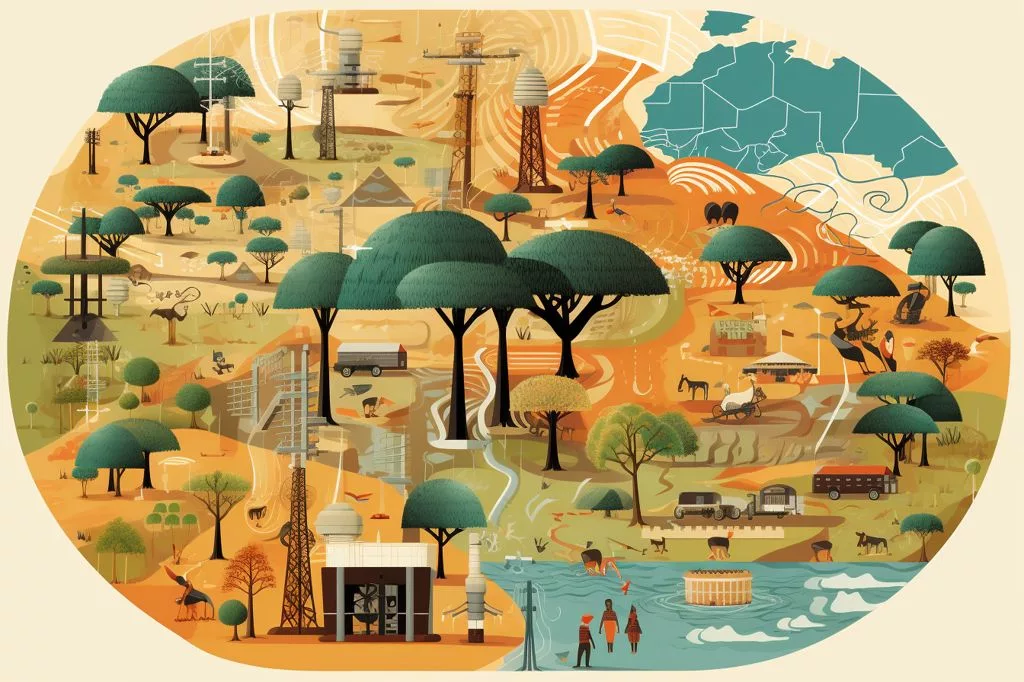At the African Energy Week Conference, Minister of Mineral Resources and Energy, Mr. Gwede Mantashe, emphasized the issue of energy poverty in Africa and the need for a holistic approach to the energy mix. Collaboration among African nations is necessary to provide sustainable, affordable, and reliable energy for everyone. The conference also highlighted the importance of a diverse energy mix, including fossil fuels, and the need for investment in infrastructure and financing for sustainable development. Overall, the conference aimed to promote a people-centered approach to energy that will drive economic growth and industrialization in Africa.
What is the issue of energy poverty in Africa?
Approximately 600 million people in Africa do not have access to electricity, which calls for a holistic approach to the energy mix. The approach should ensure sustainable energy supply and prevent future disruptions. Collaboration among African countries is necessary to provide affordable, reliable, and sustainable energy for everyone in accordance with the United Nations’ Sustainable Development Goal 7.
Minister of Mineral Resources and Energy, Mr. Gwede Mantashe, spoke at the prestigious African Energy Week Conference about the issue of energy poverty in Africa and the necessity for a comprehensive and diverse energy mix. This platform sets itself apart from other energy conferences by promoting critical and constructive discussions surrounding various energy technologies.
Approximately 600 million people in Africa do not have access to electricity, which highlights the need for a holistic approach to the energy mix. This approach should ensure a sustainable energy supply and prevent future disruptions. Mantashe emphasizes the need for increased cooperation among African countries, with the goal of providing affordable, reliable, and sustainable energy for everyone in accordance with the United Nations’ Sustainable Development Goal 7.
African nations should collaborate to promote fair energy transitions, shifting from high to low carbon emissions in a manner that suits their unique national circumstances. Mantashe argues that these countries should not merely adopt standards set by developed nations, but rather advocate for energy sovereignty, demonstrating the resilience, reliability, and efficiency of new energy technologies before phasing out older ones.
Fossil Fuels and Beyond: Africa’s Diverse Energy Mix
In order to achieve growth and prosperity in Africa’s energy sector, investments in a diverse energy mix are required. Fossil fuels continue to play a significant role in supporting energy security, providing 82% of global energy. As such, Africa must increase efforts to develop its oil and gas sector, allowing the continent to benefit from the anticipated growth in the natural gas market.
Recent oil discoveries in Namibia and Côte d’Ivoire, as well as gas discoveries in South Africa, have been transformative, intensifying the need for further exploration campaigns on the continent. Mantashe addressed the issue of weaponized climate change against development, led by foreign-funded NGOs. He suggested that African countries should unite and require these NGOs to register and publicly declare their funding sources.
Minerals play an essential role in the rapidly growing global clean energy sector and related technologies. Consequently, Africa must ensure a reliable, responsible, and sustainable supply of these minerals. Emphasis should be placed on sharing best practices and standards in the development and beneficiation of these minerals in their countries of origin.
Infrastructure and Financing: Building a Sustainable Energy Future
Countries such as South Africa, Egypt, and Mauritania have seen increased investments in modern energy technologies like solar, wind, hydro, and battery storage. This demonstrates Africa’s commitment to promoting sustainable development within the energy sector. Mantashe recognizes the importance of striking a balance between energy security, energy access, and energy transitions.
Investments in infrastructure, including refining and transmission capacity, are crucial for improving the resilience of Africa’s energy systems. South Africa currently faces challenges related to grid capacity and transmission lines, impacting the allocation of capacity for renewable energy projects.
Constructing an ideal future for Africa requires collective efforts to address energy challenges by balancing dispatchable baseload and intermittent generation. Mantashe notes that some developed nations have acknowledged the necessity for baseload energy due to the intermittent nature of renewable energy, causing them to return to fossil fuels. As a result, finding the right balance between intermittent and baseload energy is vital for enhancing security and stability in Africa’s energy supply.
Access to low-cost finance is crucial for the sustainable development of the energy sector. Mantashe calls on progressive financial institutions, such as the New Development Bank, to provide low-cost and sustainable financing for sustainable energy projects, including carbon capture, utilization, and use (CCUS).
In summary, the African Energy Week Conference should serve as a catalyst for realizing a “New Deal on Energy in Africa” – a people-centered approach to ensuring continental economic growth, development, and industrialization. As African leaders, it is vital to maintain a collective presence in global energy discussions, given Africa’s abundant natural resource endowment.
What is the diverse energy mix in Africa?
Africa’s energy mix includes fossil fuels, as well as modern energy technologies like solar, wind, hydro, and battery storage. Emphasis should be placed on developing the oil and gas sector to benefit from the anticipated growth in the natural gas market, as well as ensuring a reliable, responsible, and sustainable supply of minerals for the rapidly growing global clean energy sector and related technologies.
What is the importance of infrastructure in Africa’s energy sector?
Investments in infrastructure, including refining and transmission capacity, are crucial for improving the resilience of Africa’s energy systems. Challenges related to grid capacity and transmission lines need to be addressed to enable allocation of capacity for renewable energy projects.
What is the “New Deal on Energy in Africa”?
The “New Deal on Energy in Africa” is a people-centered approach to ensuring continental economic growth, development, and industrialization. It aims to provide sustainable, affordable, and reliable energy for everyone in Africa through a diverse energy mix and investments in infrastructure and financing.
What is the role of fossil fuels in Africa’s energy sector?
Fossil fuels continue to play a significant role in supporting energy security, providing 82% of global energy. Africa must increase efforts to develop its oil and gas sector, allowing the continent to benefit from the anticipated growth in the natural gas market.
What is the role of minerals in Africa’s energy sector?
Minerals play an essential role in the rapidly growing global clean energy sector and related technologies. Africa must ensure a reliable, responsible, and sustainable supply of these minerals, with emphasis placed on sharing best practices and standards in their development and beneficiation.
Why is low-cost finance crucial for Africa’s energy sector?
Access to low-cost finance is crucial for the sustainable development of the energy sector. Progressive financial institutions, such as the New Development Bank, should provide low-cost and sustainable financing for sustainable energy projects, including carbon capture, utilization, and use (CCUS).
What is the importance of balancing dispatchable baseload and intermittent generation?
Finding the right balance between intermittent and baseload energy is vital for enhancing security and stability in Africa’s energy supply. Some developed nations have returned to fossil fuels due to the intermittent nature of renewable energy, emphasizing the need for baseload energy.
What is the role of African nations in addressing energy poverty?
Collaboration among African nations is necessary to provide sustainable, affordable, and reliable energy for everyone. A holistic approach to the energy mix should ensure a sustainable energy supply and prevent future disruptions, with emphasis on promoting fair energy transitions that suit unique national circumstances.








